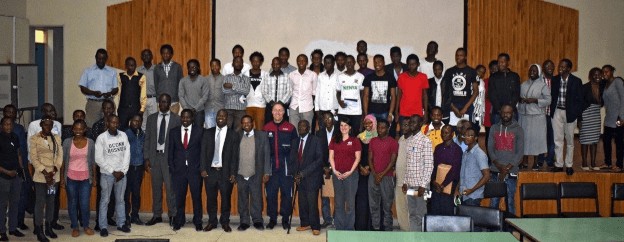Africa Region
Twenty-one years after the first African satellite, SunSat-1, was launched to space by South Africa in 1999, the industry has accelerated with hundreds of millions USD invested into it. The last four years have been very successful for the African space scene. A total of 20 satellites have been launched by African states since 2016 totaling 41 satellites. Egypt leads the way with nine launched satellites, followed by South Africa with eight, Algeria with seven, Nigeria with six, and Morocco with three. Ghana, Sudan, Ethiopia, Angola, Kenya, Rwanda and Mauritius complete the list. To this, we can add three GEO telecommunications satellite multilateral projects. Two of them launched under an agreement with RASCOM, the Regional African Satellite Communication Organization, representing the interests of 44 African telecommunications operators, the first African telecommunication satellites covering the whole continent. The third satellite in question is NewDawn, built for Intelsat and Convergence Partners. Regarding satellite development capabilities, Nigeria, South Africa, and Egypt are all developing infrastructure for assembly, integration, and testing of satellites among others. Furthermore, Algeria opened eight years ago the Center for Satellite Design (CDS).
Regional Coordinators Africa
Regional Team Africa
Of the 41 aforementioned satellites, only 9 were designed, manufactured, and assembled in Africa and led by African states while the rest were partially or fully delivered by foreign states. In some cases, through international educational CubeSat projects such as The Joint Global Multi-Nation Birds Satellite in 2017 (GhanaSat-1 and NigeriaEduSat-1), KiboCube in 2018 (1Kuns-PF from Kenya and MIR-Sat 1 from Mauritius) and TUBSAT in 2001 (Morocco). In other cases, countries directly purchase the satellites, such as Morocco’s Mohammed VI A and B, delivered by Airbus (platform) and Thales Alenia (payload). Sometimes this includes partnerships with foreign companies were local engineers participate in the development and manufacturing of the satellite such as Algeria’s AlSat-1B, Nigeria’s NigeriaSat-1, and NigeriaSat-2. These three satellites were launched under the Disaster Monitoring Constellation (DMC): A consortium of EO satellites to form a constellation for disaster monitoring and mitigation. This highlights how the lack of funding has always been a major problem in the African industry which is why this one is driving more attention to Small Satellites development (Nanosatellites). In fact, of the nine fully African satellites launched to date, all were CubeSats except for one and six of them were launched by South Africa.
It is key that African countries continue to increase their investment in the space sector. The space industry contributes to the objectives of the continent for smart, sustainable, and inclusive growth. It drives scientific progress and boosts growth and employment in other areas such as telecommunications, navigation, and Earth observation. These systems and services guarantee independence and security, while also helping to address major societal challenges including food insecurity, climate change, water scarcity, urban sustainability, and others.
Current/Recent SGAC Activities in Region
SGAC activities in Africa date back to 2002. We currently (2020) have activities spanning through more than 25 African countries with over 40 National Point of Contact (NPoCs), a number that we expect to keep growing in the next years. Hence, we invite individuals passionate about making Africa the next frontier in the global Space industry to join the team. Our most important event The African Space Generation Workshop (AF-SGW); a two-day regional workshop for students and young professionals in the African region. This event is aimed at bringing together students and young professionals to discuss current and upcoming space sector opportunities and challenges with a regional perspective. We want to promote the voice of the next generation of space leaders in Africa. There have been already three successful AF-SGW organized in the past, and a fourth one is expected for this year.
1st AF-SGW – Akure City, Nigeria – 16-17 November 2017
Organized in conjunction with the Centre for Space Research and Applications, Federal University of Technology, Akure. The theme and key objective of the AF-SGW was: To Ignite the Birth of the Next Generation of African Space Science Leaders
2st AF-SGW – Port-Louis, Mauritius– 17-18 December 2018
The theme for this year’s AF-SGW was “Launching Africa: Space Exploration, Innovation and Business”. There were a total of four working groups: Space law and policy for innovative and sustainable development in Africa, Leveraging the value chains in space business, STEM Outreach and Role of Youth in the Development of the African Space Sector, and Capacity Building and SDGs. The workshop counted with the support of a number of sponsors and partners, including Lockheed Martin, Secure World Foundation, and NewSpace Systems among others.
3st AF-SGW – Addis Ababa, Ethiopia – 30 November – 1 December 2019
The theme for this year’s AF-SGW was “Africa Rising: Space Technology and Innovation for a Sustainable Future”. Some of the deleagtes also had the chance to attend the 8th African Space Leadership Congress (ASLC) on Space Science and Technology for Sustainable Development, themed “Prospects and Challenges of African Space Development”, also in Adis Ababa, the 2 – 4 December 2019. There were a total of four working groups: Space Law and Policy in Africa, Space Business and Entrepreneurship, STEAM and Outreach – The Crucial Role of the Youth in the Space Sector, and Space Technology to Support the Sustainable Development Goals (SDGs). The workshop counted with the support of a number of sponsors and partners, including Nanoracks, TeleOrbit, the UN Economic Commission for Africa, and Space in Africa among others.
4st AF-SGW – Coming Soon
Various other SGAC activities have been organized by our NPoCs. These include Yuri’s night, world space week, asteroid day, asteroid search campaign, GIS day, NASA International Space Apps Challenge, Global Space Balloon Challenge, YouthMappers Maphathons, webinars for space careers, webinars on sustainable development goals, local space education and outreach events at schools and high schools, and much more. Below, a list of the most important events organized more recently:



